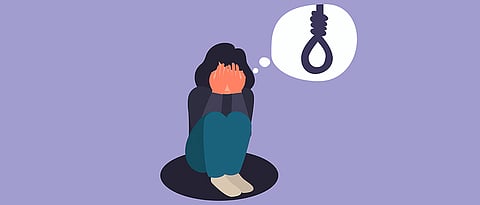

There are very few instances when the topic of suicide becomes a part of our conversation. Either we wait for a renowned person or celebrity to succumb to it due to substance use or relationship problems, or when a person with poor financial conditions takes his life because he/she can’t deal with it anymore. And yes, then there is the exam season when you hear about students who kill themselves either because of the impending exams or after they don’t get the result they were expecting to get.
Even though these incidences are very saddening, the picture is far more complicated. Did you know that suicide was the second-leading cause of death among the age group 15-29-years in India? (The Lancet, 2012). According to the data compiled by the National Crime Records Bureau (NCRB), every hour a student kills oneself in India. The NCRB data shows that 10,159 students died by suicide in 2018, which is quite alarming!
Young Indian men are shown to have around 1.52 times the rate of suicide deaths as compared to their first-world counterparts, whereas, a woman in India between the ages of 15-29 years is 3-6 times more likely to die by suicide than a woman in the West.
Let’s talk specifically about Maharashtra. Maharashtra had the highest number of student suicides in 2018. The youth of a country is considered as its real wealth, and India is losing its wealth because there is hardly any information about the reasons behind this tragic phenomenon. Due to this lack of information, and overall lack of awareness among the people, substantial steps aren’t being taken to improve the situation.
Suicide attempts are 10-20 times more common than suicides. People who have attempted suicides previously have a higher risk of repeating it. It is very common for people who have attempted suicide to go on to have mental health problems in the future. People are at risk of causing themselves physical injury when they attempt suicide, and both the attempters and their families go through trauma and emotional turmoil.
We read these articles, feel sorry for the deceased and their family for a few seconds and move on with our lives without realising how common suicides are. If you think about it, you will realise that you probably know at least one person who has died by or attempted suicide. They may be someone who is related to you, someone you are friends with, someone who is a neighbour, an acquaintance or maybe you, at some point in your life may have tried hurting yourself.
“The news of her/his suicide came to me as a shock! He/she were doing just fine before they did this.” This is the sentence we commonly hear when there is news of someone killing themselves. This is a myth. Suicides are never a stand-alone event. People show signs of distress in various ways like- drastic changes in mood and behaviour, aggressiveness and irritability, withdrawing from activities, crying spells, reckless behaviour, increased substance use, depression etc. Spotting these changes and addressing them head-on is critical. Taking help of a mental health professional in such cases proves to be vital.
To address the why
There is very little known about why suicides attempts are so common in the 15-29-year age group in India. Young Lives Matter (YLM), a brainchild of Madhumitha Balaji, Researcher in Mental Health, is a research project that is being hosted by Sangath, Goa and conducted in the Psychiatry department of Postgraduate Institute, Yashwantrao Chavan Memorial Hospital (YCMH) and Dr DY Patil Medical College, Hospital & Research Centre (DY Patil), finding out the causes of suicide attempts so that it can be prevented it in the future.
Dr Smita Panse (YCM), Dr Manjeet Santre (YCM), and Dr Daniel Saldanha (DY Patil) who are professors at the respective psychiatry departments are overseeing the project at the hospitals. The unique quality of this project is that it is also trying to study effects like social media that are more relevant to the current young generation. People between the ages 15-29 years who are admitted to the hospital because of their suicide attempt are interviewed to study the reasons behind their attempt, along with other aspects of their personality like aggression and impulsivity. The information given is completely confidential, and they get a safe environment to talk about their problems. YLM hopes that the findings of this project are used to formulate suicide prevention policies, which were announced in the Mental Health Care Act 2017.
***
COVID-19 has created havoc in our lives for the past few months. These are uncertain times, and in this situation, many people are going through emotional turbulence. There have been multiple reports where people have killed themselves suicide due to unemployment, fear of infection, stigmatisation by society, or due to alcohol withdrawal, amongst many other reasons. Feeling anxious, depressed, or lonely can cause you to have suicidal thoughts.
Here are some strategies you could use if you are having self-harming thoughts:
For more information on how to cope with COVID-19, please refer to the following links:
If you are having suicidal thoughts and are in immediate need for help, you could call these following helplines and seek help. These helplines have a confidentiality and anonymity policy.
Connecting NGO: 9922004305 (Marathi, Hindi & English)
iCALL: 022 25521111 (Marathi, Hindi, English, Konkani, Gujarati, Tamil, Telugu, Malayalam & Punjabi)
Aasra: 9820466726/ 022 27546669 (Hindi and English)
Sneha: 04424640050 (English and Tamil)
(Prajakta Kanhere Dubey is a Master’s degree holder in Clinical Psychology and has been working with Young Lives Matter as a Research Assistant. She has earlier worked as a school counsellor.)
